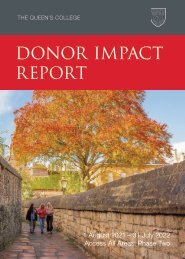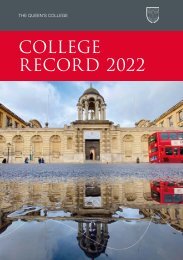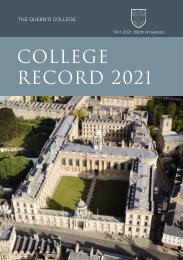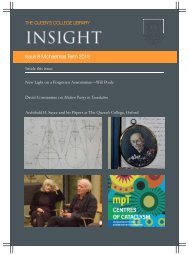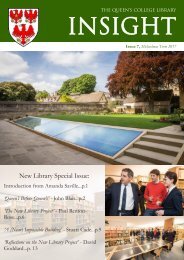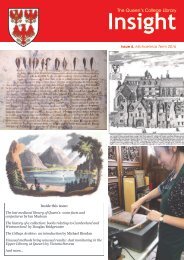Eagle Eye Magazine Issue 1 2023
Take a dive into the research and work that's going on at The Queen's College and beyond its walls within the community of Old Members. In issue one, we celebrate Shakespeare's First Folio, ask our history Fellows what makes them passionate about their subject, explore the new accessible Porters' Lodge, ask a current student about how to engage positively with climate issues, and much more.
Take a dive into the research and work that's going on at The Queen's College and beyond its walls within the community of Old Members. In issue one, we celebrate Shakespeare's First Folio, ask our history Fellows what makes them passionate about their subject, explore the new accessible Porters' Lodge, ask a current student about how to engage positively with climate issues, and much more.
You also want an ePaper? Increase the reach of your titles
YUMPU automatically turns print PDFs into web optimized ePapers that Google loves.
“The ocean makes up 70% of the Earth’s<br />
surface area, yet the majority of species<br />
inhabiting the ocean remain undescribed.<br />
OCEANS<br />
Racing against time to complete the<br />
largest ocean census in history<br />
COUNT<br />
Photo: iStock.com/Nuture<br />
Dr Denise Swanborn (Environmental Research, 2018) tells us about her<br />
work with Ocean Census, the largest ever ocean survey.<br />
You are part of a project called Ocean Census which aims to<br />
accelerate the discovery of ocean life. Can you share a bit more<br />
about the programme?<br />
Ocean Census launched on 27 April <strong>2023</strong>. It has been set up<br />
by two founding partners, Nekton and the Nippon Foundation,<br />
and has set the ambitious target of finding at least 100,000 new<br />
marine species in the first decade. Oxford is the headquarters<br />
of Ocean Census. The programme is a global open alliance<br />
of partners, and we are actively seeking research institutes,<br />
universities, and, in particular, taxonomists to partner with us.<br />
Why is it important to do this now?<br />
The ocean makes up 70% of the Earth’s surface area, and ocean<br />
life is fundamental to all life on Earth. It produces the oxygen<br />
we breathe, isolates carbon dioxide, creates food for billions of<br />
people and is constantly providing vital scientific advances to fight<br />
disease. Yet the majority of species inhabiting the ocean remain<br />
undescribed, especially in the deep sea. Today, scientists believe<br />
they have described little over 10% of the species that exist. Ocean<br />
Census aims to significantly change this, as we cannot protect and<br />
sustain what we do not know.<br />
To conserve and sustain the life that you uncover in the ocean,<br />
what measures are being taken as part of the project?<br />
We set up a series of global expeditions to the ocean’s biodiversity<br />
hotspots to find new life from the surface to full ocean depth<br />
(10,925 metres). These expeditions will be run on vessels from<br />
the philanthropic, government, academic, and commercial fleets.<br />
We are deploying a combination of advanced subsea technologies<br />
with divers, human submersibles, and remotely operated vehicles<br />
(ROVs). As Expedition Manager, I work on the implementation of<br />
these expeditions.<br />
Specimens collected on expeditions will be sent to Biodiversity<br />
Centres, where they will be analysed and described. All resulting<br />
data will be uploaded into a database so that networks of<br />
taxonomists will connect virtually to draw on the aggregated<br />
data set created. This aggregated, open-sourced data is added to<br />
a network of data centres globally and made freely accessible to<br />
scientists, marine policymakers and the public.<br />
How will you use machine learning and other new technologies<br />
to analyse the data?<br />
Recent technological advances in high resolution imaging,<br />
DNA sequencing, and machine learning mean scientists can<br />
now massively accelerate the process of species discovery and<br />
description. Ocean Census will deploy high-precision sampling<br />
tools to collect corals and other large organisms during<br />
expeditions. This means that a small number of individual<br />
samples will be collected and then preserved for further analysis<br />
in museums or other laboratories. Sub-samples will be taken for<br />
DNA analysis. Smaller organisms that live in sand or mud will be<br />
collected as small samples of sediment, preserved and then later<br />
extracted. We work with scientific and business partners for the<br />
latest and most efficient technology to accelerate the process of<br />
DNA analysis and species description.<br />
21









